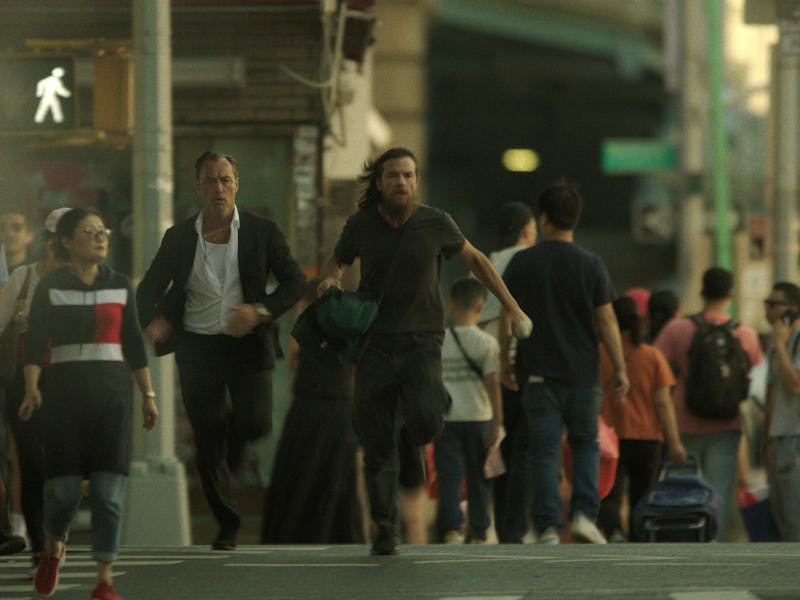Black Rabbit Digs Itself Into A Dark Prestige-TV Hole
The Jude Law and Jason Bateman crime thriller is a brutal eight-hour slog.

Black Rabbit starts with a bang — or at least the threat of one. Jake Friedkin (Jude Law) is toasting his beautiful New York City restaurant, which unfolds over three elegant stories, celebrating all the hard work his cooks and crew have put into making this special night happen. He’s no stranger to a corny declaration, telling those dining that he wanted to make a restaurant that would be “a home for our family, our friends, our people.” Before Jake can end his toast and continue the festivities, his dream becomes a nightmare, as two armed men start to rob the place, and hold Jake at gunpoint.
It’s an exhilarating starting point for the new Netflix series, created by Zach Baylin and Kate Susman (who also wrote four of the series’ eight episodes). But it comes with a caveat: before anything else happens, we’re taken back to a month before the robbery. It’s here we see the introduction of Jake’s brother Vince (Jason Bateman), who Jake hasn’t spoken to in 7 months since their mother passed away. Vince is stuck in Reno, and is in need of cash bail out so he can make his way back to New York. Jake agrees and buys Vince a plane ticket to JFK, and with the Friedkin brothers back together, things begin to rapidly spiral out of control. Well, not rapidly. Black Rabbit unfolds over a brutal eight hours, which often has the show treading water as it repeats familiar beats ad nauseum, and fills its dialogue with so many f-bombs that you start to wonder if the writers ran out of things to say.
The central mystery of the show surrounds the heist: why it happened, who’s involved, and what the circumstances were that led to such a dramatic event. But it’s something you can largely piece together over the first couple episodes, leading to nearly eight hours of an already-solved mystery that slowly pieces itself together in front of your eyes. That means much of Black Rabbit is a murky slog to the inevitable.
Anti-hero narratives sprung to popularity in the early 2000s with shows like The Sopranos and Breaking Bad, leading to countless other stories hoping to emulate the popularity and success of those programs. But what so many of those subsequent narratives miss is why those two shows are universally beloved. Despite watching Tony Soprano and Walter White commit unthinkable evils, they still had plenty of redeeming and intriguing qualities that had you root for them. But the characters in Black Rabbit are far more “anti” than “hero.” Baylin and Susman spend so long portraying Vince as an utterly detestable scumbag (which is established from his very first scene) that by the time any attempt at redemption comes along, it falls on deaf ears. Jake is sympathetic at first, but the more that’s unveiled results in the question of whether he’s every bit as smarmy as his brother, or just a man in an increasingly desperate situation. Neither makes you want to get in his corner.
Troy Kotsur’s crime boss is the only other standout of the ensemble.
Other characters don’t fare much better. Black Rabbit has a wide, sprawling cast, but other characters are never given time to develop or become more than two-dimensional archetypes. It’s as if one detail about each of the people working in or adjacent to the restaurant would be more than enough to make for a developed character. Of the group, head chef Roxie (Amaka Okafor) and designer Estelle (Cleopatra Coleman) are most intriguing, but neither are given the space — or the script — to deliver something memorable. The only member of the cast who really shines outside of the Friedkin brothers (though both Bateman and Law have been much better elsewhere) is Troy Kotsur, whose role as crime boss Joe is a display of frightening malice. It’s great to see Kotsur in a role so different from his Oscar winning turn in CODA, though it’s a shame he’s only got a handful of scenes in Black Rabbit.
Perhaps Black Rabbit is a victim of bad timing. In an increasingly divided world, a narrative about a debt that’s ever increasing alongside endless work days is probably the last thing the average person wants to see right now. But the problem with Black Rabbit isn’t that it's dark, but it’s bleak for the sake of being bleak. It’s dark not only in narrative but cinematography, casting dark shades and grays over every imaginable proceeding. Its plot leaps around time in hopes to find something interesting to say, but it ends up repeating the same things over and over again.